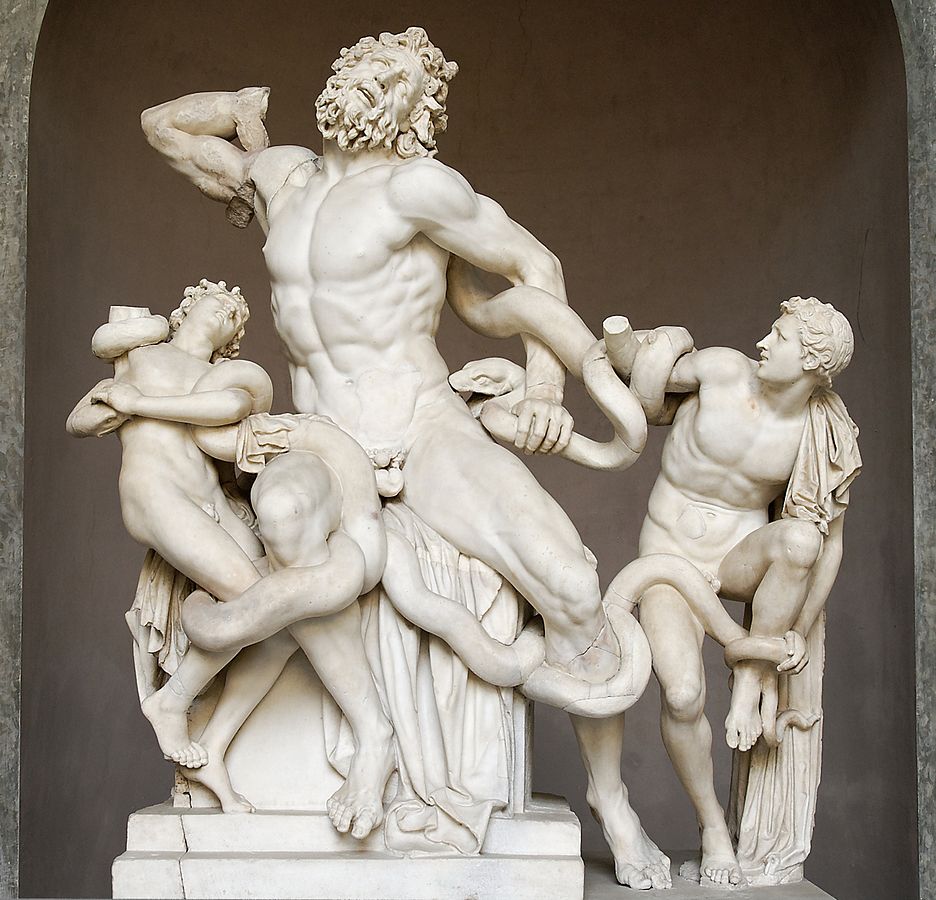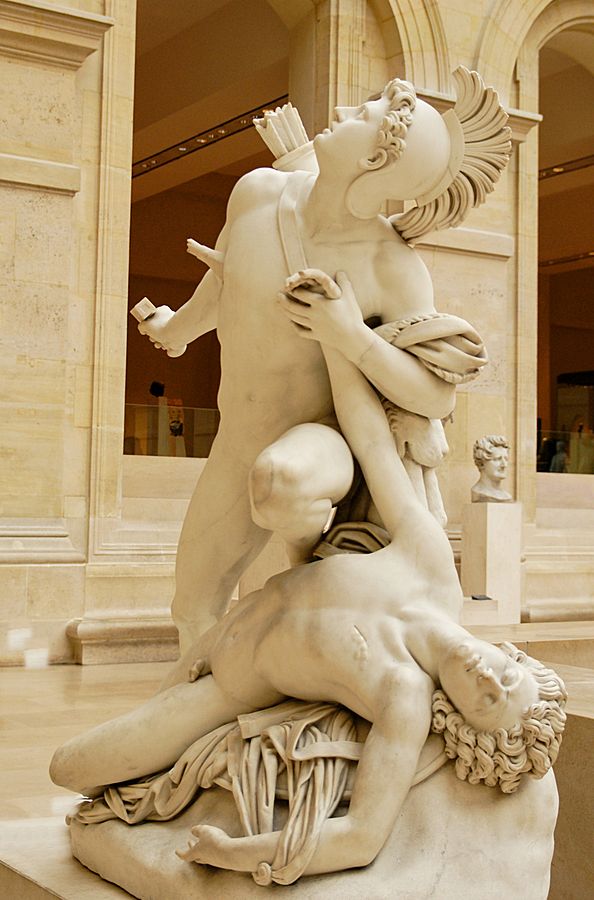Laocoön and the Trojan horse
Wheelock:Chapter 8
Graecī cum Trōiānīs bellum gerunt. Magnum equum ligneum sub portīs Urbis Trōiae nocte relinquunt. Trōiānī equum ibi inveniunt. “Graecī equum Minervae dēdicant,” dīcunt. “Sī dōnum Graecōrum ad templum deae dūcēmus, pācem habēbimus et vītam bonae fortūnae agēmus.” Sed Lāocoön[1], sacerdōs, magnae virtūtis sapientiaeque, audit populum monēre: “Sine ratiōne cōgitātis, ō Trōiānī! Sī cōpiae in equō sunt, magnō in perīculō erimus. Nōn dēbētis Graecīs crēdere, nam Graecī semper sunt falsī.” Tum equum hastā tundit. Īra Minervae magna est; dea duōs serpentēs ex marī mittit. Ō miser Lāocoön! Tē tuōsque duōs fīliōs malī serpentēs strangulant! Trōiānī deam timent; equum in urbem dūcunt. Ratiō Lāocoöntis Trōiānōs nihil docet.

[1]: priest of Neptune at Troy
Translation:##
Greeks wage a war with Trojans. They leave a big wooden horse under the gate of Troy City at night. Trojans find the horse there. “Greeks devote the horse to Minerva,” they say. “If we lead Greeks’ gift to the goddess’ temple, we will have peace and live a life with good fortune.” But Laocoon, a priest, with great virtue and wisdom, dare warn the people: “you think without consideration, Trojans! If there are troops in the horse, we will be in great danger. You shouldn’t believe in Greeks, for Greeks are always deceitful.” Then he hits the horse with a spear. Minerva is very angry; she sends two serpents from the sea. Poor Laocoon! The evil serpents strangle you and your two sons! Trojans fear the goddess; They lead the horse into the city. The consideration of Laocoon teaches Trojans nothing.
Nisus and Euryalus
Wheelock: Chapter 9
Aenēās[2] Trōiānōs contrā Rutulōs[3] dūcit. Dum nox est et cōpiae dormiunt, ducēs Trōiānōrum in castrīs cōnsilium habent. Ad hōs Nīsus[4] Euryalusque[5], iuvenēs Trōiānī, audent venire. “Ō magnī virī,” dīcit Nīsus, “sī mē cum Euryalō aad castra Rutulōrum mittētis, nōn sōlum multōs hominēs occīdēmus, sed etiam multam paredam ex illīs rapiēmus; somnus enim istōs habet.” “Animōs virtūtemque hōrum iuvenum laudō!” exclamāt Iūlus, fīlius Aenēae illīus. “Valēte!”
Nunc veniunt Nīsus Euryalusque in castra Rutulōrum. Occīdunt ūnum, tum multōs aliōs. Euryalus ōrnāmenta ūnīus, galeam alterīus, rapit. Cum hāc praedā fugiunt. Sed Volcēns, dux Rutulōrum, illōs Trōiānōs videt et aliōs Rutulōs vocat. Splendor istīus galeae illōs ad Euryalum dūcit. Nīsus hunc in perīculō videt et audit amīcum servāre. Occīdit Volcentem, sed iste anteā Euryalum occīdit. Tum aliī Nīsum superant; hic super corpus Euryalī cadit.
Hanc fābulam tōtam Vergilius[6] scrībet et hīs Trōiānīs fāmam perpetuam dabit.

[2]: a Trojan, ancestor of the Romans
[3]: ancient inhabitants of Latium
[4]: a Trojan soldier
[5]: a Trojan soldier
[6]: Publius Vergilius Maro (70-19 B.C.), a famous Latin poet wikipedia
Translation:
Aeneas leads Trojans against Rutulians. One night when the troops are sleeping, the leaders of Trojans are having planning session in the camp. Nisus and Euryalus, (two) Trojan youths, come to the meeting. “Great men,” says Nisus, “if you send me with Euryalus to the camp of Rutulians, not only can we kill many people, but also we can rob them.” “I praise these youths’ spirits and virtue!” exclaims Iulus, son of the Aeneas. “Farewell!”
Now Nisus and Euryalus come to Rutulians’ camp. They kill one man, then more others. Euryalus snatches a fancy clothing and another helmet. They flee with these loots. But Volcens, the leader of Rutulians, see those Trojans and calls out other Rutulians. The shine of that helmet leads them to Euryalus. Nisus sees them in danger and serves himself for his friend. He kills Volcens, but Volcent killed Euryalus earlier. Then some Rutulians defeat Nisus, he fall on the body of Euryalus.
This whole story is written by Vergil and it will give these Trojans eternal fame.
Aurora and Tithonus
Wheelock: Chapter 10
Aurōra[7] dea Tīthōnum[8], virum pulchrum, amat. Venit igitur ad Iovem: “Ō rēx deōrum,” dīcit, “audī mē! Meus Tīthōnus nōn est deus; post paucōs annōs ad senectūtem veniet. Sī vītam perpetuam huic dabis, tē semper laudābō.” Stulta Aurōra! Magnum perīculum illīus dōnī nōn vidēs. Immortālitātem Tīthōnō dat Iuppiter, sed ille, dum vīvit, senēscit. Tempus fugit: nunc Aurōra bella, Tithōnus nōn bellus est. Corpus rūgōsum curvumque iam nōn valet; sapientia in animō nōn manet. Quid Aurōra faciet? Poteritne fōrmam Tīthōnō restituere? Cōgitat et cōnsilium capit: “Ō Tīthōne, mī amor! Tē vertam in cicādam; tum garrīre sine culpā poteris. Hāc in cāveā vīvēs, et tē semper amābō.”
[7]: goddess of the dawn
[8]: a Trojan prince
Translation:
The goddess Aurora loves Tithonus, a beautiful man. Therefore she comes to Juppiter: “The king of gods,” she says, “help me! My Tithonus isn’t a god; after a few years he will come to old age. If you give (him) a perpetual life, I will always praise you.” Stupid Aurora! You don’t see the great danger of that gift. Juppiter gives Tithonus immortality, but he gets old while he lives. Time flies: now Aurora is beautiful, but Tithonus isn’t. His wrinkled and bent body is not strong; the wisdom doesn’t remain in his soul. What will Aurora do? Will she be able to restore Tithonus beauty? She thinks over and gets a plan: “Tithonus, my lover! I will turn you into a cricket; then you will be able to babble without fault. You live in this cage, and I will love you forever.”